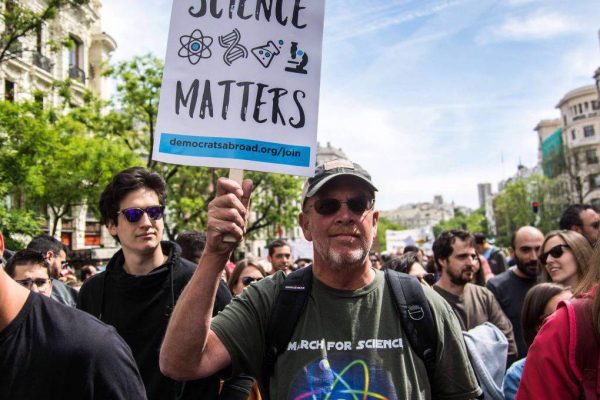by Hugo Mercier
On some issues, the majority of scientists agree, but large segments of the public are not convinced, resulting in consensus gaps. Unfortunately, many of the most important gaps today relate to sustainability.
For example, there is a long-standing scientific consensus about the reality of climate change and what causes it. Yet, ten years ago, only half of Americans believed that human activity caused global warming (and one-third still doubt it). Similarly, the overwhelming majority of scientists, along with expert groups, agree that genetically modified foods are safe to eat, and can play an important part in helping to feed the world while reducing carbon dioxide emissions. But in most countries, large numbers of citizens think that GM foods harm both consumers and the environment.
Furthermore, most experts – including the United Nations Intergovernmental Panel on Climate Change – believe that nuclear power should play a role in lowering global greenhouse-gas emissions. But in many countries, a large share of the population regard nuclear energy as dangerous and even polluting.
These consensus gaps are worrying not only because they lead to socially costly individual actions that generate large amounts of CO2, but also because public opinion influences policy. Germany shut down about half of its nuclear power capacity in response to public pressure following the 2011 Fukushima Daiichi accident in Japan. But that decision indirectly resulted in thousands of deaths from air pollution as production by coal-fired power plants replaced the lost nuclear output.
Yet, in most cases, people are happy to accept the scientific consensus, assuming that they are aware of it: few dispute that water is H2O or that light consists of photons, for example.
To understand why consensus gaps exist in some domains, and how we can bridge them, we need to consider the psychology of communication, or how we decide what to believe and whom to trust.
When we evaluate a message, we first compare its content with our pre-existing opinion: if there is a clash, we tend to reject the message. In the case of scientific information, people cannot rely on their personal experience, but they still have intuitions. Unfortunately, most scientific theories are counter-intuitive: my intuitions tell me that the sun revolves around the earth, which is flat, for example. Similarly, many find it intuitively implausible that puny humans can affect Earth’s climate, have an instinctively negative reaction to foods that have been modified in “unnatural” ways, and have a learned fear of nuclear energy, probably because of its link with nuclear weapons.
Unsurprisingly, therefore, many scientific results in these fields percolate only slowly to the public – especially if interest groups capitalize on the findings’ counter-intuitiveness to mount organized resistance.
But rejecting messages that do not fit with our intuitions is only an initial reaction, which can be overcome under the right conditions. For starters, people pay attention to a variety of cues in deciding how much they should trust the source of any message, and, fortunately, they still trust scientists. As a result, when people are informed that a scientific consensus exists in a given domain, they tend to adjust their opinions in the direction of the consensus.
Still, why not simply accept the consensus? How can members of the public believe that they are more likely to be right on a scientific issue than thousands of experts who have spent their lives studying it?
Alas, we all tend to believe that we understand things better than we do. Many people may think they know how a toilet flush works, but when asked to explain the mechanism, most realize that their understanding is actually fairly limited. Yet, even if few of us would claim to know exactly how a nuclear reactor functions, or how GM food is produced, we still tend to overestimate our understanding and thus downplay the knowledge gap between us and the scientists. When people are taught about mechanisms – such as how climate change works, and what GM technology is – their respect for the scientific consensus increases.
But the best way to change people’s minds is through respectful argumentation. When opponents of GM food are told that scientists think such food is perfectly safe to consume, they will likely question the credibility of that information, for example by asking how many studies there have been on the topic, or whether the scientists involved have conflicts of interest. As long as these questions are not answered, GM food’s critics won’t change their minds much.
During a 2018 science festival in France, researchers Sacha Altay and Camille Lakhlifi attempted to relay the scientific consensus about GM food to small groups. In discussions lasting up to a half-hour, they addressed many counter-arguments, and created substantial shifts in opinion, with participants’ average view of GM food going from opposition to tentative support.
A newly formed scientific consensus does not automatically and immediately gain acceptance among the public. This does not mean that people are hopelessly stubborn, but rather that they need good reasons to change their minds. Scientists, educators, and other public figures must communicate the consensus, explain the basic mechanisms involved, and patiently and knowledgeably talk to people and address their remaining qualms. We cannot hope to overcome consensus gaps if we give up on reasoned discourse.
Hugo Mercier is a research scientist at the Institut Jean Nicod – part of the French National Center for Scientific Research (CNRS) – and the author of Not Born Yesterday: The Science of Who We Trust and What We Believe (Princeton University Press, 2020).
Read the original article on project-syndicate.org.
More about: science
















































